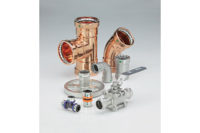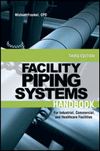PVF distributors making waves in the Dakotas and Montana
Boom goes the Bakken.

According to a March Dakota Industrial Commission report more than 700,000 barrels of oil per day are produced out of the Bakken shale region in North Dakota. Photo by Eloise Ogden, Minot (N.D.) Daily News.

AustinSmith, a warehouse worker and driver for Apex Remington, loads a pallet in the company’s Watford City, N.D., warehouse.Photo courtesy of Apex Remington.

Apex Remington Assistant Manager Harry Smith uses a forklift to transport product at the company’s Waterford City, N.D., pipe yard.Photo courtesy of Apex Remington.

A truck carries oil tanks from the Bakken region through New Town, N.D.Photo by Eloise Ogden, Minot (N.D.) Daily News.




Along time ago the saying was “Go West, young man.” Nowadays, it’s “Get to the Dakotas.”
The modern-day oil boom in the Bakken region — covering a majority of North Dakota, northwestern South Dakota, eastern Montana and in the Canadian province of Saskatchewan — has been an impressive launching pad for PVF distributors willing to commit resources to the area. Even distributors outside the region are seeing strong benefits as the United States is reaching new levels of domestic oil production.
The oval-shaped region is about 475 miles North to South and stretches 300 miles East to West. Oil was drawn from the region more than 50 years ago, but only from a few vertical wells. New technologies and the much-talked about fracking phenomenon have been major keys to this current boom time. Fracking is the process of fracturing rock layers through the use of pressurized liquid. Hydrofracturing is when a large amount of water is mixed with sand (and sometimes chemicals) and injected with high pressure into the earth’s faults, releasing petroleum, natural gas and more.
Bloomberg News reported in May that the Bakken region has helped lift U.S. oil production to highs not met in 20 years. In March, the North Dakota Industrial Commission stated 718,791 barrels of crude oil per day were coming from the Bakken area. The report added that Bakken area production, coupled with oil outputs from the Eagle Ford formation in southern Texas and the Permian Basin in western Texas helped spike U.S. oil production levels to 7.37 million barrels a day.
Tom Sokolhelped Tulsa, Okla.-based distributor Apex Remington open its lone North Dakota branch. Sokol, a regional manager with 33 years of PVF distribution industry experience, says he came across a whole new set of challenges as he and the company developed and opened its Watford City, N.D., location.
“If you bring people in, there is no local housing, certainly no affordable housing,” he says. “The rates are double or triple what they might be elsewhere in the country just to get an apartment or a mobile home (due to the massive influx of workers in the area).”
Apex Remington rectified the problem as best it could by investing in infrastructure on the company grounds. Of the nine acres Apex Remington owns in Watford City, two are dedicated to housing for its employees and families. The company installed eight trailer hookups and purchased six freestanding trailers.
“All those are expensive and cost us overhead money that we would not have spent anywhere else,” he says. “As part of our employee package there, we subsidize the cost of trailers and employees pay for rent and utilities. It comes out to less than half the current market rate.”
Apex owns four single-wide, three-bedroom, one-bathroom trailers and a pair of double-wide, four-bedroom, two-bathroom trailers.
“We’ll add more as we need them, but right now we can accommodate families of some size,” Sokol says. “We didn’t want to get into oil-field, heavy-density living situations. There is plenty of that here already. That is not what Apex is about.”
The arrival of new companies and workers into the region has manifested logistical problems. Traffic in the area causes major headaches and locals are struggling to adapt.
“This is a tough place for people to live with the crowding, constant traffic and the influx of strangers,” Sokol says. “All of that is above and beyond the tough winters.”
Crime also is on the rise in the area. Apex Remington hasn’t had any issues regarding pipe theft at its location, but Sokol reports Watford City is adjusting to increased levels of property and violent crime.
“That town went from zero crime to some crime,” he says. “It feels extreme to them. People are coming here from all over. They’re young, single men working two weeks on, one week off and sometimes three weeks on, one week off. They’re young, healthy American guys looking for fun or trouble.”
In the Bakken region, the employees have quite the pull in the marketplace. Pay for positions at McDonalds, Wal-Mart and local grocery stores reportedly starts around $16 per hour. Securing employees, and loyal employees at that, can be a tough job.
“We are paying top-dollar for the supply house industry here,” Sokol says. “But if someone wants to jump and work on the rigs or drive an oil truck, an hourly employee can move into a higher-paying situation at almost any time. That’s disconcerting. You don’t have that in other areas of the country.”
Apex Remington has lost a couple employees to the higher-paying, but more dangerous jobs in the 18 months since opening its North Dakota branch, but has been able to replace the departed workers.
A new normal
Apex Remington continues to adapt to the new way business is done in the Bakken region. Sokol says the company will load 28 enclosed trailers with products earmarked for specific companies and let them pick apart the trailers over a period of time.
“We let it sit there for one, two and sometimes three weeks and then it comes back,” Sokol says. “We inventory the trailer and charge one invoice for everything that is missing. It’s not optimum, but that’s the business model. It’s all for the customer. That’s the new standard.”
Sokol notes that while the company is seeing growth in that region, competition remains fierce. “You would think providing those types of upfront, onsite warehousing margins in a boom area would make things better than they are,” he says. “Frankly, we and our competition struggle to make good margins. It’s tough, but it’s competitively priced. Volume is not an issue, but you have to work really hard to make money.”
The type of customer purchasing products in the region is evolving as well. “We find that more of the business in the Bakken is controlled by field-level people such as the field supervisors, foremen and in some cases the contractors,” Sokol says. “We have a lot of variability in the way things are purchased, which is unusual. We have to have contracts to capture the full breadth of what needs to be purchased.”
Even distributors that don’t officially plant a flag in the Bakken region, such as Duncan, Okla.-based M&M Supply, are strongly benefitting from the boom. M&M Supply’s Enid, Okla., branch is nearly an 18-hour drive to the region, but CEO Randy Trachtenberg reports 10% to 15% of its monthly sales come from the Bakken area.
“The major operators in the Bakken are mid-continent-based companies,” he says. “Their workforce comes from the region where material is available on very short notice. This doesn’t exist to date in the Bakken, however the demands are still required by the field personnel.”
Both M&M Supply and Apex Remington say the region has been in need of threaded and flanged ball valves, as well as stainless-steel fittings capable of handling higher pressures.
“In the fracking process, these wells let out a lot of salt water,” Trachtenberg explains. “There’s a lot more use of stainless steel in the oilfield industry than before.”
A bright future
Affiliated Distributors has 80 companies in the PVF division of its buying group and reports a nearly 6% sales increase in the first quarter of 2013 after a full year of positive gains in 2012. A-D PVF Division Vice President Gary Jackson says that’s no surprise to the group given how its members have handled business since the boom began. “Our energy-related members have certainly led the way with above-average growth over the last few years,” he says.
A few years ago, A-D created a subset of about 10 wholesaler members that focuses on the oil and gas markets. Those companies have been interested in and studied the Bakken regions, as well as the Marcellus (Pennsylvania) shale and the various other shale markets in Texas.
“It’s the same set of wholesalers with the same skill sets,” Jackson says. “There is a core group of A-D members that are very active and follow the geographic opportunities.”
The Bakken shale boom began in 2009. It’s the biggest boom that Trachtenberg, a 20-plus-year industry veteran, has seen in his professional life. Sokol recently heard reports that experts believe the region is well-positioned to produce for years to come.
“The convention I just returned from discussed the Bakken and the Niobrara (located in Nebraska),” Sokol says. “We had heads of companies discussing profitability and the longevity of these resources. I didn’t hear a number smaller than 20 years and many much longer than that.”
Sokol says companies are still figuring out drilling spacing in the region. “Companies used to put four wells in two 640-acre parcels of land,” he says. “Now those companies are looking to put as many as 32 wells in that section and get full production. There is a lot of drilling left to be done.”
Trachtenberg says domestic steel mills are starting to come back online because of the Bakken and the U.S. oil boom areas as end users desire American-made products. In early June, the Wall Street Journal reported that U.S. oil production has surpassed the amount of foreign oil the country imports.
“There is a lot of discussion that this country can be energy independent,” Trachtenberg says. “The numbers I’ve seen say the Bakken region can produce for the next 100 years.”
HELPFUL LINKS:
- Contact Supply House Times
- Apex Remington
- M&M Supply
- Affiliated Distributors
- Follow Supply House Times on Twitter!
- Find Supply House Times on Facebook!
Looking for a reprint of this article?
From high-res PDFs to custom plaques, order your copy today!













